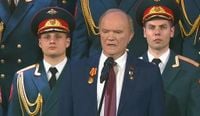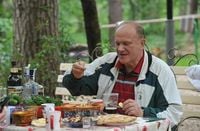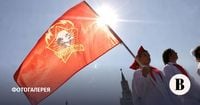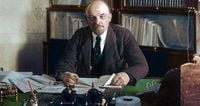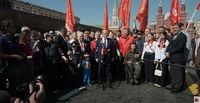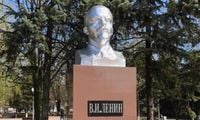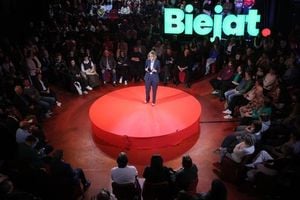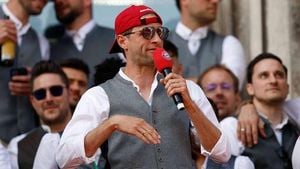Today, April 22, 2025, marks the 155th anniversary of the birth of Vladimir Ilyich Ulyanov, better known as Lenin, the first chairman of the Council of People's Commissars of the USSR. This significant occasion was observed with solemnity as representatives of the Communist Party of the Russian Federation (CPRF), led by party leader Gennady Zyuganov, laid wreaths and flowers at Lenin's Mausoleum on Red Square. The event also included memorials at the Tomb of the Unknown Soldier in the Alexander Garden, the monument to Georgy Zhukov at the State Historical Museum, and the grave of Joseph Stalin at the Kremlin wall.
The ceremony brought together not only CPRF deputies but also participants from the special operation and various public organizations. Zyuganov, in his speech, emphasized the importance of Lenin's legacy, stating that "Lenin is an example of selfless struggle for the interests of the working class, equality, and friendship among nations." He further noted that the Soviet experience of state building and socio-economic development serves as a fundamental basis for uniting society and mobilizing it for new victories.
In the lead-up to this anniversary, Zyuganov reflected on Lenin's historical significance, calling him a brilliant thinker and revolutionary who had an immense impact on the course of history. He remarked, "The great Lenin is our history!" This sentiment echoed throughout the commemorative events, emphasizing Lenin's enduring influence on contemporary society.
The day began with a live broadcast by Krasnaya Liniya from the press approach following the laying of flowers at the Mausoleum. The Central Committee of the CPRF, alongside various left-national patriotic organizations, organized the event, which also coincided with the opening of the Second International Anti-Fascist Forum. This forum gathered participants from across the globe, reinforcing the idea that Lenin's principles continue to resonate and inspire.
As part of the celebrations, Zyuganov and other CPRF leaders engaged in discussions about the relevance of Lenin's teachings in today's political landscape. In an interview, Zyuganov expressed that the Soviet model of governance remains a vital reference point for contemporary Russian society. He stated, "The Soviet experience of state building is the principled foundation for rallying our society towards new great victories."
During the event, Zyuganov also addressed the youth, urging them to understand the importance of honoring Lenin's memory. "Lenin was a simple man from the people who built a people's state where power belonged to the proletariat," he explained. This message resonated particularly with younger attendees, many of whom are increasingly interested in the historical narratives surrounding the Soviet era.
The atmosphere at the event was one of reflection and pride among the attendees, many of whom carried portraits of Lenin and Stalin. The presence of veterans and participants from the special operations added a layer of solemnity to the proceedings, underscoring the ongoing significance of these historical figures in modern Russia.
In a separate interview, Zyuganov responded to questions about the current political climate and the CPRF's stance. He clarified that while the party supports President Vladimir Putin, they are in opposition to other political parties. "We are not against the president; we are against the other parties," he asserted, emphasizing the CPRF's role in the political landscape.
As the day unfolded, discussions about the legacy of the Soviet Union and its leaders continued to dominate the narrative. Zyuganov defended the Soviet period, asserting that the achievements of the USSR in education and healthcare were unmatched. "Soviet education and medicine were the best in the world," he proclaimed, challenging critics who often highlight the deficiencies of the Soviet system.
However, Zyuganov did not shy away from addressing the complexities of Soviet history. When asked about the collapse of the Soviet Union, he acknowledged that while some successes were achieved for the nomenklatura, the broader goal of communism for the people was nearly realized. "We were just beginning to approach this stage when the bourgeois invaders came in," he lamented.
The discussions also touched on the ideological battles within the communist movement, with Zyuganov dismissing rival factions as opportunistic. He characterized the leader of the Communists of Russia, Maxim Suraykin, as an imposter designed to siphon votes from the CPRF. "Without him, we would have certainly won and formed our own government," he stated.
As the commemoration drew to a close, the significance of Lenin's teachings and the relevance of the Soviet experience in contemporary politics were underscored by both Zyuganov and the attendees. The event served not only as a remembrance of a pivotal figure in Russian history but also as a rallying point for those who continue to advocate for the values Lenin espoused.
In the eyes of many, the legacy of Lenin is not merely a relic of the past; it is a living ideology that continues to inspire discussions about equality, social justice, and the role of the state in the lives of its citizens. As the CPRF and its supporters look to the future, they remain committed to keeping Lenin's ideas alive, asserting that they are more relevant now than ever.
